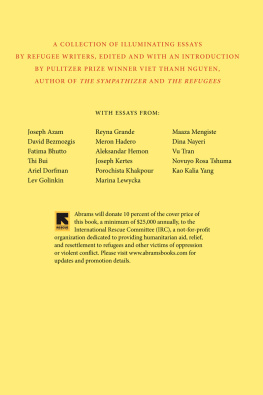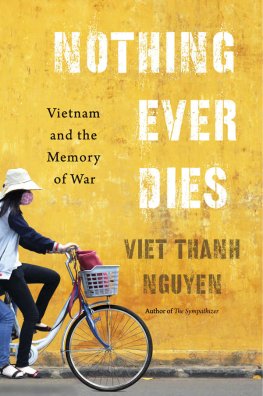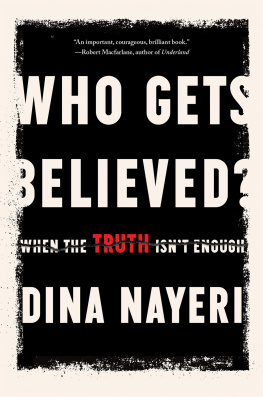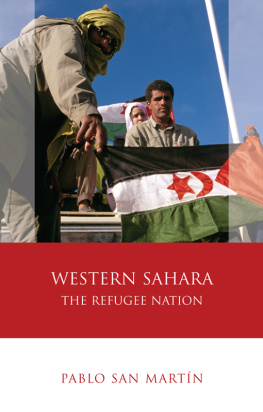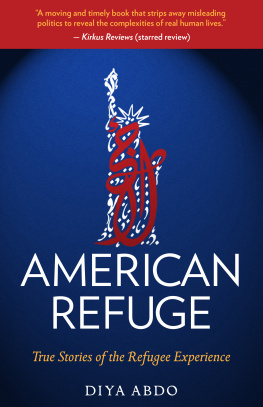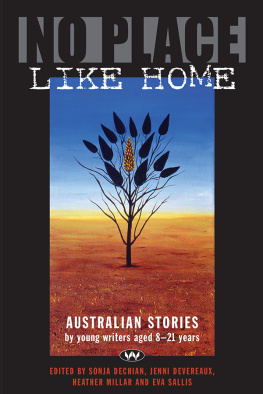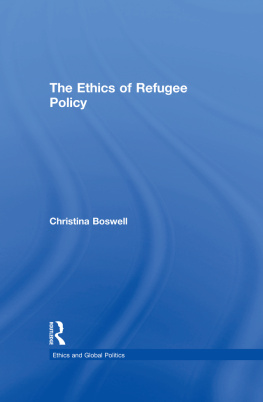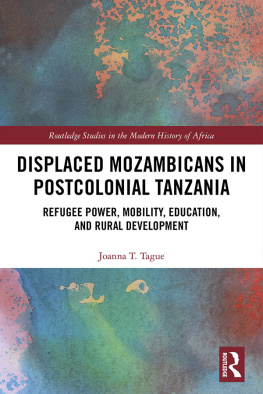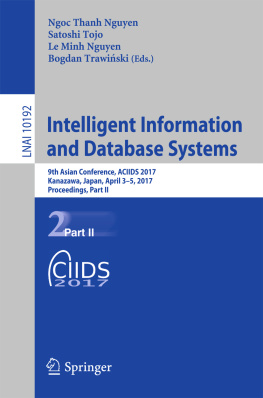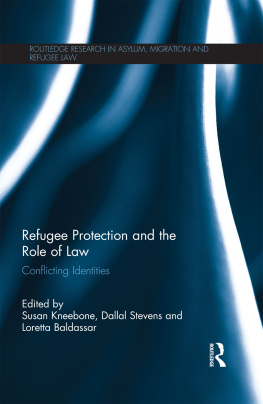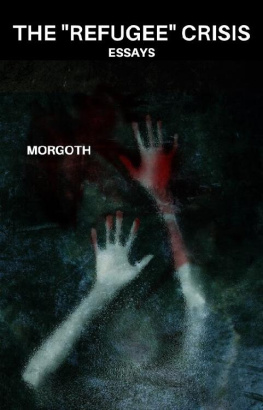Viet Thanh Nguyen - The Displaced: Refugee Writers on Refugee Lives
Here you can read online Viet Thanh Nguyen - The Displaced: Refugee Writers on Refugee Lives full text of the book (entire story) in english for free. Download pdf and epub, get meaning, cover and reviews about this ebook. year: 0, publisher: Abrams Press, genre: Science. Description of the work, (preface) as well as reviews are available. Best literature library LitArk.com created for fans of good reading and offers a wide selection of genres:
Romance novel
Science fiction
Adventure
Detective
Science
History
Home and family
Prose
Art
Politics
Computer
Non-fiction
Religion
Business
Children
Humor
Choose a favorite category and find really read worthwhile books. Enjoy immersion in the world of imagination, feel the emotions of the characters or learn something new for yourself, make an fascinating discovery.
- Book:The Displaced: Refugee Writers on Refugee Lives
- Author:
- Publisher:Abrams Press
- Genre:
- Year:0
- Rating:5 / 5
- Favourites:Add to favourites
- Your mark:
- 100
- 1
- 2
- 3
- 4
- 5
The Displaced: Refugee Writers on Refugee Lives: summary, description and annotation
We offer to read an annotation, description, summary or preface (depends on what the author of the book "The Displaced: Refugee Writers on Refugee Lives" wrote himself). If you haven't found the necessary information about the book — write in the comments, we will try to find it.
The Displaced: Refugee Writers on Refugee Lives — read online for free the complete book (whole text) full work
Below is the text of the book, divided by pages. System saving the place of the last page read, allows you to conveniently read the book "The Displaced: Refugee Writers on Refugee Lives" online for free, without having to search again every time where you left off. Put a bookmark, and you can go to the page where you finished reading at any time.
Font size:
Interval:
Bookmark:

Compilation copyright 2018 Harry N. Abrams, Inc.
Introduction copyright 2018 Viet Thanh Nguyen
Cover 2018 Abrams
Last, First, Middle 2018 Joseph Azam; Common Story 2018 David Bezmozgis; Flesh and Sand 2018 Fatima Bhutto; Perspective and What Gets Lost 2018 Thi Bui; How Succulent Food Defeated Trumps Wall Before It Has Been Built 2018 Ariel Dorfman; Guests of the Holy Roman Empress Maria Theresa 2018 Lev Golinkin; The Parent Who Stays 2018 Reyna Grande; To Walk in Their Shoes 2018 Meron Hadero; Gods Fate 2018 Aleksandar Hemon; Second Country 2018 Joseph Kertes; 13 Ways of Being an Immigrant 2018 Porochista Khakpour; Refugees and Exiles 2018 Marina Lewycka; This Is What the Journey Does 2018 Maaza Mengiste; The Ungrateful Refugee 2018 Dina Nayeri; A Refugee Again 2018 Vu Tran; New Lands, New Selves 2018 Novuyo Rosa Tshuma; Refugee Children: The Yang Warriors 2018 Kao Kalia Yang
A version of Flesh and Sand previously appeared in the November 2017 issue of Vogue Italia.
A version of How Succulent Food Defeated Trumps Wall Before It Has Been Built previously appeared in the Los Angeles Times, and is also published in his essay collection, Homeland Security Ate My Speech.
The Ungrateful Refugee previously appeared in the Guardian.
Published in 2018 by Abrams Press, an imprint of ABRAMS. All rights reserved. No portion of this book may be reproduced, stored in a retrieval system, or transmitted in any form or by any means, mechanical, electronic, photocopying, recording, or otherwise, without written permission from the publisher.
Abrams Books will donate 10% of the cover price of this book to the International Rescue Committee (IRC) with a minimum contribution of $25,000. The IRC, a not-for-profit organization, is dedicated to providing humanitarian aid, relief and resettlement to refugees and other victims of oppression or violent conflict. Please refer to the back of this book for more information about the IRC.
Library of Congress Control Number: 2017949746
ISBN: 978-1-4197-2948-5
eISBN: 978-1-68335-207-5
Abrams books are available at special discounts when purchased in quantity for premiums and promotions as well as fundraising or educational use. Special editions can also be created to specification. For details, contact specialsales@abramsbooks.com or the address below.

ABRAMS The Art of Books
195 Broadway, New York, NY 10007
abramsbooks.com
VIET THANH NGUYEN
JOSEPH AZAM
DAVID BEZMOZGIS
FATIMA BHUTTO
THI BUI
ARIEL DORFMAN
LEV GOLINKIN
REYNA GRANDE
MERON HADERO
ALEKSANDAR HEMON
JOSEPH KERTES
POROCHISTA KHAKPOUR
MARINA LEWYCKA
MAAZA MENGISTE
DINA NAYERI
VU TRAN
NOVUYO ROSA TSHUMA
KAO KALIA YANG
VIET THANH NGUYEN
I was once a refugee, although no one would mistake me for being a refugee now. Because of this, I insist on being called a refugee, since the temptation to pretend that I am not a refugee is strong. It would be so much easier to call myself an immigrant, to pass myself off as belonging to a category of migratory humanity that is less controversial, less demanding, and less threatening than the refugee.
I was born a citizen and a human being. At four years of age I became something less than human, at least in the eyes of those who do not think of refugees as being human. The month was March, the year 1975, when the northern communist army captured my hometown of Ban Me Thuot in its final invasion of the Republic of Vietnam, a country that no longer exists except in the imagination of its global refugee diaspora of several million people, a country that most of the world remembers as South Vietnam.
Looking back, I remember nothing of the experience that turned me into a refugee. It begins with my mother making a life-and-death decision on her own. My father was in Saigon, and the lines of communication were cut. I do not remember my mother fleeing our hometown with my ten-year-old brother and me, leaving behind our sixteen-year-old adopted sister to guard the family property. I do not remember my sister, who my parents would not see again for nearly twenty years, who I would not see again for nearly thirty years.
My brother remembers dead paratroopers hanging from the trees on our route, although I do not. I also do not remember whether I walked the entire one hundred eighty-four kilometers to Nha Trang, or whether my mother carried me, or whether we might have managed to get a ride on the cars, trucks, carts, motorbikes, and bicycles crowding the road. Perhaps she does remember but I never asked about the exodus, or about the tens of thousands of civilian refugees and fleeing soldiers, or the desperate scramble to get on a boat in Nha Trang, or some of the soldiers shooting some of the civilians to clear their way to boats, as I would read later in accounts of this time.
I do not remember finding my father in Saigon, or how we waited for another month until the communist army came to the citys borders, or how we tried to get into the airport, and then into the American embassy, and then finally somehow fought our way through the crowds at the docks to reach a boat, or how my father became separated from us but decided to get on a boat by himself anyway, and how my mother decided the same thing, or how we eventually were reunited on a larger ship. I do remember that we were incredibly fortunate, finding our way out of the country, as so many millions did not, and not losing anyone, as so many thousands did. No one, except my sister.
For most of my life, I did remember soldiers on our boat firing onto a smaller boat full of refugees that was trying to approach. But when I mentioned it to my older brother many years later, he said the shooting never happened.
I do not remember many things, and for all those things I do not remember, I am grateful, because the things I do remember hurt me enough. My memory begins after our stops at a chain of American military bases in the Philippines, Guam, and finally Pennsylvania. To leave the refugee camp in Pennsylvania, the Vietnamese refugees needed American sponsors. One sponsor took my parents, another took my brother, a third took me.
For most of my life, I tried not to remember this moment except to note it in a factual way, as something that happened to us but left no damage, but that is not true. As a writer and a father of a son who is four years old, the same age I was when I became a refugee, I have to remember, or sometimes imagine, not just what happened, but what was felt. I have to imagine what it was like for a father and a mother to have their children taken away from them. I have to imagine what it was that I experienced, although I do remember being taken by my sponsor to visit my parents and howling at being taken back.
I remember being reunited with my parents after a few months and the snow and the cold and my mother disappearing from our lives for a period of time I cannot recall and for reasons I could not understand, and knowing vaguely that it had something to do with the trauma of losing her country, her family, her property, her security, maybe her self. In remembering this, I know that I am also foreshadowing the worst of what the future would hold, of what would happen to her in the decades to come. Despite her short absence, or maybe her long one, I remember enjoying life in Harrisburg, Pennsylvania, because children can enjoy things that adults cannot so long as they can play, and I remember a sofa sitting in our backyard and neighborhood children stealing our Halloween candy and my enraged brother taking me home before venturing out by himself to recover what had been taken from us.
Next pageFont size:
Interval:
Bookmark:
Similar books «The Displaced: Refugee Writers on Refugee Lives»
Look at similar books to The Displaced: Refugee Writers on Refugee Lives. We have selected literature similar in name and meaning in the hope of providing readers with more options to find new, interesting, not yet read works.
Discussion, reviews of the book The Displaced: Refugee Writers on Refugee Lives and just readers' own opinions. Leave your comments, write what you think about the work, its meaning or the main characters. Specify what exactly you liked and what you didn't like, and why you think so.

